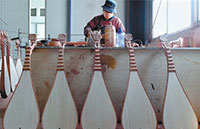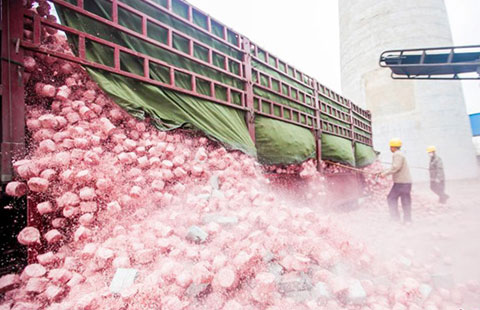Battle against poverty still hard in remote mountains
(Xinhua) Updated: 2015-11-25 15:50LIFE OF THE POOR
Nonghua village is located in Du'an Yao Autonomous County in Hechi City, northwest Guangxi, where the Yao minority makes up 60 percent of its 700 population.
Girls change their fate by getting married with someone outside the village, but Nonghua seldom welcomes in a bride, men here are too poor to have wives.
Luo Anhua, 43, is still single. He had a girlfriend who is also of Yao nationality from a nearby village, but she left him because of the extreme poverty.
While his 40-year-old younger brother Luo Anshun has never experienced any romance.
The brothers live together with their 70-year-old mother in a wood- roof shed. They have to crowd in on three beds in front of a fire, as chilly winds seep in through their bamboo walls.
"We are too old, and look at this place we live, no one would marry us." Luo Anhua said with despair in his voice.
The situation in Nonghua is not an exception. Just more than 150 kilometers south lies Longmu village, Du'an Yao Autonomous County.
Two years ago, villager Peng Yujie's 19-year-old son left Longmu to work as a migrant worker. Peng hasn't heard from his son since.
"He may never come back," said Peng, "It's too poor here."
Like others, Peng lives in a two-floor wood shack, with pigs and chickens in the bottom and him living on top.
People eke out a living by growing corn. The annual per-capita income is less than 1,900 yuan (about 300 U.S. dollars), the poorest of the poor as the country's poverty line is 2,300 yuan in annual income.
They have to tramp over hills and dales for seeds and fertilizer, the same mountains that have become a hindrance for dozens of villages' development.
"Pig breeders have to hire people to carry pigs all the way out to the village for sale, and we can only use horses to transport commodities, both cost a lot," Chang Lusheng from the nearby Longfu County told Xinhua.
- Largest coal mine identified in east China
- Three local officials under graft investigation
- 13m unregistered people to be given hukou recognition
- New ship to ferry supplies to S. China Sea
- Some officials took part in terrorism, watchdog says
- China vows to win battle against poverty
- Nation to lift 50m out of rural poverty in five years
- Drone flying will face stricter monitoring
- Traffic back to normal after snow
- Left-behind girls face higher risks







